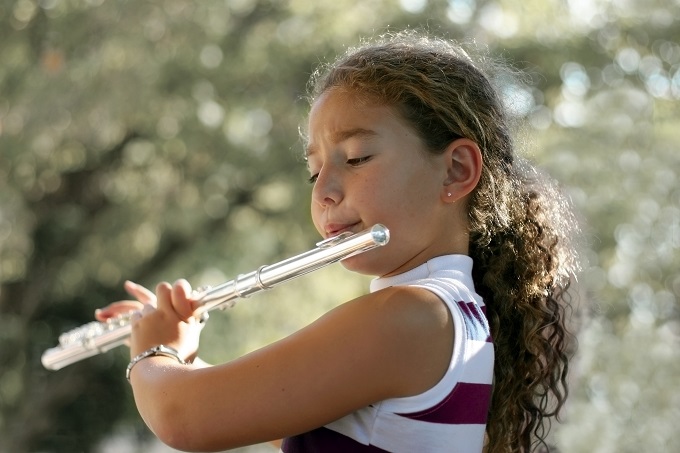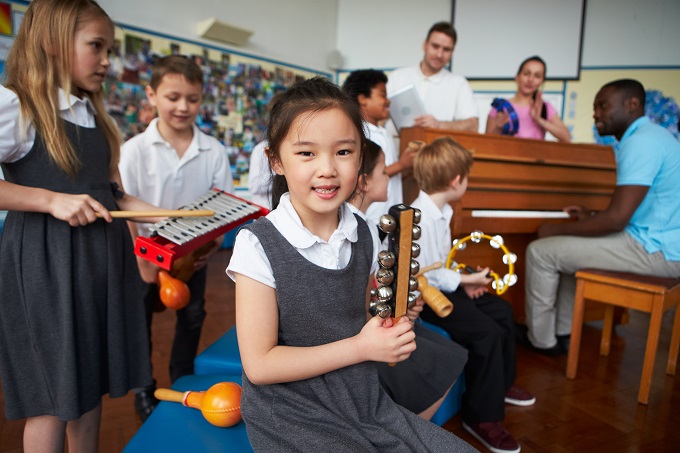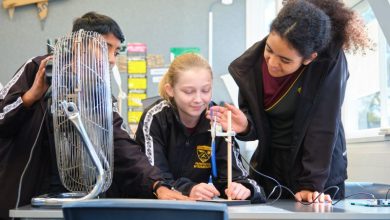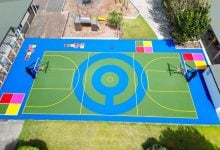The benefits of music lessons in schools

All children benefit from music education, not just those with a lot of talent. Time and again, research shows us that learning music helps children to achieve better academically and socially. Learning a musical instrument takes that learning up a notch.
In studies undertaken at Stanford University, California, researchers found that mastering a musical instrument improves the way the human brain processes parts of spoken language, that people with musical experience found it easier than non-musicians to detect small differences in word syllables, and that musical training helps the brain work more efficiently in distinguishing split-second differences between rapidly changing sounds that are essential to processing language.

Researcher Nadine Gaab says the findings have important potential implications for improving speech processing in children struggling with language and reading skills. And report co-author, professor John Gabrieli says the research shows how musical training alters how the brain processes language components.
“It shows how important split-second timing is for understanding language—if you’re bad at it, you’re at risk of becoming a bad reader. But what’s important is that people are not stuck with this—the study shows that with training people improved their perception of sounds. It shows that our mental capacity is amenable to experience: The brain is plastic, adaptable and trainable.”
The benefits of learning an instrument go well beyond academic achievement. Researchers at Auckland University evaluating the South Auckland cluster of El Sistema, a programme which seeks to effect social change through the pursuit of musical excellence, found that El Sistema students were not only ahead of their peers in reading and maths, but they recorded better levels of attendance and higher standards of behaviour. Their abilities to self-manage, participate and contribute had all improved.

Furthermore, the programme was found to reinforce family values and raise aspirations in the families of participating students. “Families demonstrate cohesiveness and work together to support their children to succeed in Sistema Aotearoa,” says Robyn Trinick, says Robyn Trinick, researcher and senior music lecturer.
The Virtuoso Strings Charitable Trust delivers a similar programme to 11 low-decile schools in Porirua East. Instrumental music lessons are run three days a week, and the trust’s orchestra of 160 rehearses twice weekly.
All instruments and lessons are provided free of charge with the cost met by trustees Liz Sneyd and Craig Utting, some community funding and sponsors. “We aim to ensure that every student is catered to, no matter how diverse their needs,” says Ms Sneyd.
“There’s not one person who’s seen us in action or followed the trust’s work who doesn’t see enormous benefits for the kids and their whānau.”
Teamwork
Working with others is a critical life skill that’s important to learn as a child. Students participating in a band or orchestra learn to work together for the greater good.
Self-discipline
Kids who learn to play an instrument can learn a valuable lesson in discipline. They will have to set time aside to practice and rise to the challenge of learning with discipline to master playing their instrument.
Pride
With encouragement from teachers and parents, students playing a musical instrument can build pride and confidence. Musical education is also likely to develop better communication for students.
The Ministry of Education supports instrumental tuition in schools by allocating allowances to secondary, area, composite and restricted composite schools so they can provide tuition in vocal and instrumental music. There is also funding available for full-time, permanently appointed, itinerant music teachers. The Ministry provides a time allowance to coordinate the programmes and for the professional development of these teachers.
One of these providers is MusiqHub a New Zealand-wide network of music teachers who deliver instrumental music lessons to students in primary and intermediate schools. These can be during class time if the school agrees, or during lunch times and after school.
“We provide structured and proven curriculums that have students performing confidently and using their instruments in a variety of settings,” says MusiqHub director Graeme Collier.
The benefit to students is obvious, he says. “We see our MusiqHub students grow in areas like self-confidence, discipline, co-ordination, self-esteem, teamwork, creativity and self expression.”
Students can choose from a wide range of instruments and are encouraged through fun learning experiences.
Some schools have a supply of musical instruments available for students to try or to hire for the year, but many prefer to contract with music suppliers who can take care of the maintenance.
“One way that schools can manage the cost of instruments, particularly with regard to brass and woodwind instruments is rather than buying them, hire them from a supplier with a rental programme that offers world class Yamaha instruments,” says Mr Collier. “An added benefit is that the hire plan includes ongoing service and maintenance of the instruments.”








